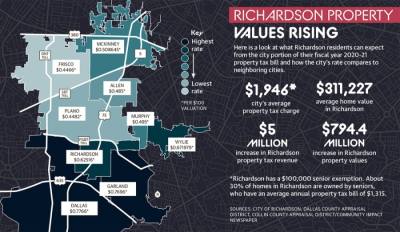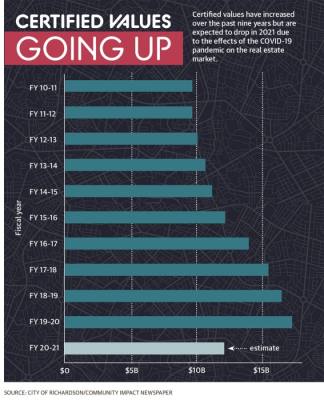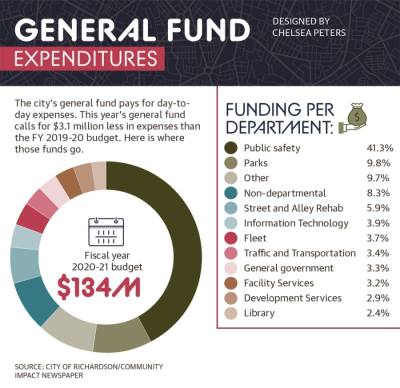The city had to quickly rethink its budgeting strategy when the crisis took hold in March. Uncertainty around the length and severity of the pandemic made it difficult to forecast revenue; however, staff remained committed to providing key services, such as street and alley repairs, parks maintenance and economic development.
Last year’s budget had already sustained unexpected losses due to the October 2019 tornado. Millions of dollars were spent on infrastructure repairs, emergency housing and more, City Manager Dan Johnson said.
The impending strain of Senate Bill 2 also played a role in building the budget, Johnson said. SB 2, which was signed into law by Gov. Greg Abbott in 2019, limits funding for municipalities by requiring voters to sign off on any property tax revenue growth in excess of 3.5% per year.
“This has quickly become the year of challenges,” Johnson said at a recent council meeting.
Staff is budgeting about $130.6 million in general fund revenue, which is down from the $136.4 million that was estimated for FY 2019-20. This year’s general fund expenditures are projected to land at about $134 million, which is down 2.3% from last year.
Property tax rate remains flat
Despite these challenges, Richardson officials were pleased to learn that the latest certified estimates from area appraisal districts show citywide property valuations increasing by about 5% year over year, according to an Oct. 19 presentation by Richardson Finance Director Keith Dagen.
Earlier this summer, staff built a budget based on a projected $297 million loss in citywide property valuation; however, the estimate available at the time represented only 33% of values in dispute, which painted an incomplete picture of where the city would land, Dagen said.
The certified tax roll now shows that property in Richardson is valued at a cumulative $17.3 billion, which is up by almost $794 million year over year and will yield $5 million more in property tax revenue.
The outcome of this year’s certified tax roll positively affected the city’s bottom line; however, other key sources of revenue have been badly hurt by the pandemic. Rather than increasing the property tax rate, the city chose instead to cut expenses, such as compensation increases, nonessential maintenance and community events. An unchanged tax rate of $0.62516 per $100 property valuation was approved unanimously in August.
Dagen warned that the city will likely see a decline in values next year due to COVID-19. This year’s values were finalized Jan. 1 and were not influenced by the crisis, Dagen said.
In August, council members took a preemptive step to soften the blow to future budgets by voting to waive the state-mandated cap of 3.5% on increases to property tax revenue growth. State law permits the waiver when a disaster declaration has been put into place, Johnson said.
The objective is to help municipalities restore revenue after a period of economic strain, such as the COVID-19 pandemic, by allowing an increase of up to 8%, he added. The option is now available for the next two fiscal years, but there are no plans to waive the cap next year, Johnson said.
Sales taxes see varied performance
Richardson’s month-over-month sales tax revenue collections have fluctuated since pandemic-related shutdowns took hold in March, data from the Texas Comptroller’s Office shows.
Sales tax revenue is critical to the city’s budget because it is the second-largest revenue source for the general fund, Assistant City Manager Shanna Sims-Bradish said. Receipts totaled $42.7 million for FY 2019-20, which ended Sept. 30, according to state data. This is $6.4 million higher than what the city projected in August.
Some months performed better than others. August, for example, saw a year-over-year increase of nearly 15%, while October saw collections fall by more than 14%.
Still, Richardson fared better than some of its neighbors during the first few months of the pandemic. Dallas saw a steady decline in sales tax collections, with some drops as severe as 24%. Plano experienced a similar trend, with collections decreasing by as much as 17%.
Sales tax revenue cannot be depended upon to create stability for the city, Sims-Bradish said.
“What is positive today could trend negative long-term as the marketplace adjusts,” she said in an email.
Silver linings
There were some silver linings in putting together the FY 2020-21 budget. For the first time in nearly 15 years, the North Texas Municipal Water District did not increase its wholesale water rate.
The district’s FY 2020-21 budget keeps the rate flat at $2.99 per 1,000 gallons of treated water for its member cities, which include Richardson, according to a Sept. 25 news release.
The district raises water and sewer rates primarily to pay for capital investments, NTMWD spokesperson Janet Rummel said.
City officials were notified this summer that the water district did not intend to raise its wholesale rate, Director of Communications Greg Sowell said. This allowed council to adopt a budget that did not include a water rate increase for residents for the first time in a decade, he added.
Richardson residents should see additional relief on the cost of water in the coming years after an amended wholesale water services contract was signed by the district and its 13 member cities Oct. 29. The new system will be phased in over the next 15 years and savings may be modest at first, but the new methodology creates a more fair and balanced system for all cities involved, City Manager Dan Johnson said in a statement.
Despite the hardships that came with this year’s budget, Mayor Paul Voelker urged the community to place trust in its city officials. He said they are doing everything they can to make sure the city emerges stronger.
“Hope is not a plan, but the Richardson way is something we can be proud of,” he said. “We plan our work, and we work our plan, and a plan is being put together to make sure we can weather this storm.”
Olivia Lueckemeyer contributed to this story.









